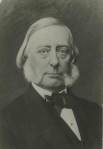The First District (parts 1, 2, 3, 4, 5, 6, 7, 8, 9) did not really do much to live up to the Bleeding Kansas of our imaginations in the territorial legislature elections of March 30, 1855. The testimony features far more in the way of threatened violence, including the gory claim that the speaker would behead one of the judges of election, than it does actual fighting. We should not minimize the power of the violent language and the display of weaponry, including cannons, but even the men who the border ruffians did attack came out apparently without losing any blood or any general disturbance. The Missourians chased one into a river and shot at him, but missed. They manhandled another, but confined themselves to lifting him up and shaking him. Aside from crowding at the polls, harassment, and initial threats that forced the resignation of two judges of the election, voting proceeded in an orderly manner.
To hear George W. Ward tell the story, the Second District had no trouble save for some officious meddling by free state men. The people who voted had genuine residence in Kansas. They behaved themselves. Maybe they had a bit of fun, but nothing truly untoward happened. Ward himself stood for election that day on the proslavery ticket.
The thirteen other witnesses disagreed. The Missouri men came, armed and intoxicated, on the morning of the election. Some, possibly all, of them came by way of Lawrence and at the specific command of their leaders there. They had enough on hand to carry the Lawrence election handily, but the Second District’s polls at Bloomington did not. That election too required stealing. Witnesses disagree on how many Missourians came to Bloomington, with numbers ranging from three hundred (Or zero if you believe Ward. Perhaps the other witnesses had remarkably uniform hallucinations?) to seven hundred or more. They arrived shortly after the polls opened and thus had to suffer the indignity of a few actual Kansans voting in the fifteen minutes to hour (witnesses differ) before they came up.
The judges of the election took some precautions. They had the polling place in a log cabin with a door in one side, which they shut, and a window on the other to take votes through. According to Ward, they had some guns inside. When the Missourians came up to the window, Harrison Burson did not recognize them and did his duty per Andrew Reeder’s instructions as judge of the election. He would allow them to vote if and only if they swore an oath that they resided then and intended to reside permanently in Kansas. Their leader, a Samuel J. Jones who later became sheriff
replied that they had come up from Missouri to vote, and they would vote, and they intended to make Kansas a slave-State. They [the Missourians] also stated that no man should vote there that day that would take the oath.
Readers who want to delve into the Howard Report should note that a Samuel Jones gave testimony on the election in the Second District. He refers to this Samuel Jones in the third person. They shared a name but not, confusingly, a body.
Some men not affiliated with the Missourians had hung around about the window waiting to vote before their arrival. With the Missourians theoretically disposed of, they gave it a go and quickly found the mob hauling them back from the polls. If the judges would not let the border ruffians vote, would they resign? They would not. Then things got interesting.
Continuing here would probably make for a very long post, so I’ll return with the excitement tomorrow.


You must be logged in to post a comment.